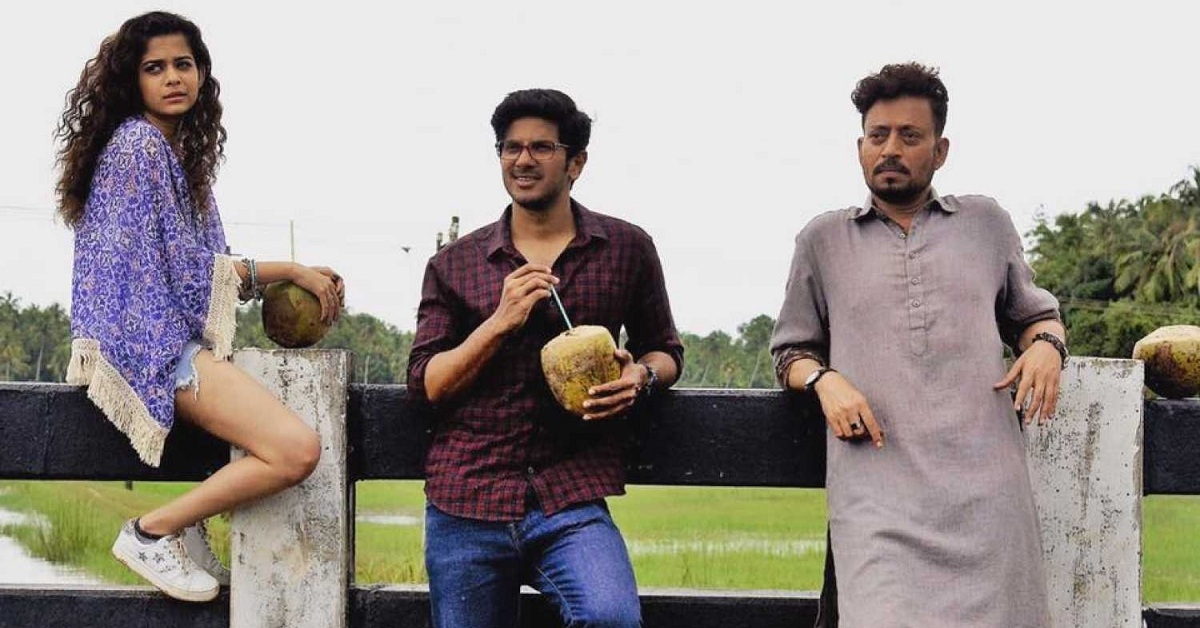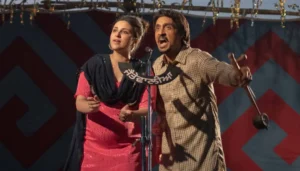
There are stories that sink in a with an organic vibe of lethargy. You can soak in their flavours like a soothing cup of coffee, derive a feeling that is as comforting as a stroll in the park or a restful afternoon on the hammock. On papers, Akarsh Khurana’s Karwaan belongs to that zone. The story flows like a placid water body minus any tumultuous twists or massive jerks. There are three principal characters taking a road trip from Bangalore to Kochi via Ooty for an unusual exchange – of a pair of misplaced coffins. No, the deaths aren’t lamented beyond a point in the film – which also becomes a slight hiccup in the midst – but the film is intended to be a young man coming-of-age and also how diverse individuals deal with tragedies.
Avinash Rajpurohit (a pitch-perfect Dulquer Salmaan) is a techie based in Bengaluru and the film opens with some context-setting on the tasteless life that he lives. In a scenario that is atypical, Avinash is bearing the burden of a painful job and the regret of not having pursued his passion for photography. We also discover a bumpy relationship that he shares with his (somewhat) estranged father. Soon erupts the news of the latter’s death and we do not see massive breakdowns and trips down the lanes of nostalgia. What follows is a process of procuring the dead body which incorporates a neat dose of wry, cynical humour which is not characteristic to Hindi cinema. Avinash with the help of his friend Shaukat (Irrfan) deal with the pandemonium and the duo set out on a journey to procure the coffin which has been mistakenly sent to Kochi.
With the languid tenor that the screenplay adopts, Karwaan demanded tad bit dynamism in the way the sequences were to be visualized and executed. Lacking precisely in that quality, Khurana’s directorial skills end up in the passive zone, only to be rescued frequently by certain lovely metaphors in the screenplay. The uninspired shot-taking is further salvaged by Avinash Arun’s cinematography which not only makes use of the panoramic quality of the story but also pays attention to the minutest of details and the well-observed production design. You get to see the right kinds of focusses, close-ups and mid-shots allowing the camera to remain still until each expression of the actors is assimilated to optimum. Adding further to the Karwaan‘s laidback beauty is a lilting original score (Prateek Khuhad, Anurag Saikia, SlowCheetah, Imaad Shah) which blends in smoothly with the film’s mood.
For a film that is technically sound, Karwaan notably flounders on certain not-so-crucial bits in the screenplay. The film perennially carries a tone of put-on exotica. Be it with regards to the people it introduces you to or the locales and surroundings that it captures, there is a surreal, impractically urban air to the narrative. At several points in the film, one wonders if the characters ever bothered about the purpose of their journey, with the coffin lying listlessly in an abandoned van. This lack of sensitivity would have worked totally in its favour if Karwaan were to be a pacy, unemotional black comedy with edgy characters. We also see a gang of goons following Shaukat to extract money that he owes them, which again belongs to an altogether different film. The casualness in the way a close-knit family (Amala Akkineni and Mithila Palkar) handles the death of their family matriarch is a little disturbing given the tone that the film chooses to assume. It also doesn’t help that Khurana’s shot-taking and editing skills are unassertive, failing to rise above the screenplay’s glaring irregularities.
Predictably enough, it is Irrfan’s crackling humour that holds the film together. Even in the most unconvincing of sequences, the actor’s goofiness wins you over. Mithila Palkar, on the other hand, makes no impact as the sexually liberated young adult who occasionally schools our leading man on life goals. It is further irksome when she repeatedly mentions her progressive grandmother whilst we hardly see her pay any heed to the woman’s decomposing dead body. Amala, Kriti Kharbanda and the peripheral characters form rather breezy elements of the film’s needlessly exoticized atmosphere.
Karwaan, at the end of the day, makes for an easy watch. At the same time, it does not fully serve as a coming-of-age drama. It works fine as a chronicle of dissimilar lives and their experiences through similar situations. Such stories would ideally ring better if they were to delve a little deeper into its characters’ psyche, which the film doesn’t. Oh yes, the one-liners didn’t hurt at all.
Rating: ★★★

